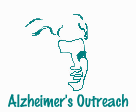 What
To Point Out To The Doctor
What
To Point Out To The Doctor
By Dr. Raymond Vickers M.D.
If you would like to print it out in plain text, click HERE
 What
To Point Out To The Doctor
What
To Point Out To The Doctor
By Dr. Raymond Vickers M.D.
If you would like to print it out in plain text, click HERE
As caregivers,
we ourselves are the single most important diagnostic tool in the search
for the truth about what's causing our loved one's confusion. Our reflections
on the history of his or her behavior changes are invaluable to the physician.
Though most physicians will want to question our loved one directly, people
in the early stages of Alzheimer's can be masters in the fine art of "cover
-up". Not a few physicians have been fooled by the perfectly normal
behavior and appearance of people with Alzheimer's in their office. You
know things are different at home, but you may need some facts to prove
it.
When attempting to reconstruct your loved one's medical and social history, there are two key words to remember: change and onset.
What are the various changes you've noticed in your loved one over the past few weeks, months, or years? When did you first notice these changes? Have they been gradual in onset, occurring over a period of time, or have they suddenly occurred?
The time frame for the appearance and progression of symptoms is an important clue for physicians to consider when making a diagnosis and deciding what tests to conduct. Before you go to the hospital or the doctors office, think through the following categories. You may even want to write down your answers and take them with you.
Affect and attitude: Has your loved one been unusually anxious, agitated, depressed, apathetic or withdrawn? When did you first notice these changes? Have there been any major events associated with these changes, such as retirement, relocation, death of a close friend or relative, or surgery?
Behavior: What specific behavior changes have you noticed? Have there been any differences in your loved one's daily routine? Have you noticed any marked personality changes, such as forgetfulness? If so, what exactly is forgotten?
Conversation: Has your loved one experienced any language difficulties? Have there been any problems related to the ability to speak or remember words? Is one word substituted for another at the end of the sentence? Are phrases mixed up or confused? Has speech become slurred or garbled?
Decision making: Have you noticed any changes in decision-making capabilities? Are there any errors in judgment? In relation to what, specifically? Is your loved one having difficulty driving? Has he or she ever wandered off and gotten lost?
Drugs: List any medications being taken, both prescription and over-the-counter. Are medications being taken correctly?
Environment: Are pots and pans burned? Are there piles of unpaid bills? Is mail stacking up? Is there evidence that your loved one is neglecting nutritional needs?
Family and Friends: What have other people---friends, neighbors, coworkers---noticed in relation to your loved ones behavior's?
Grooming and gait disturbances: Is there any changes in your loved ones ability to perform various activities of daily living related to personal grooming---bathing, dressing, toileting? Have there been any changes in their ability to walk?
Habits: What changes have you noticed in your loved ones normal habit patterns? Are there things that are simply to difficult to do now, such as balancing the checkbook, cooking, cleaning, reading, yard work, auto repair, gardening? Are there any favorite hobbies that are no longer engaged in? Have you noticed any changes in the ability and desire to socialize with others?
Illnesses: What specific physical symptoms is your loved one experiencing? Has there been any weight loss or gain?
Is there a history of any of the following: metabolic disorders such as diabetes or thyroid disease, heart or lung abnormalities, strokes, dizziness, fainting spells, headaches, shaking, seizures? Is there any history of alcoholism?
Has your loved one fallen down or had any past or recent head injuries? Has there been any exposure to any toxic chemicals in the work place? Is there any history of blood transfusions? When and where were they done? Is there any history of Alzheimer's disease or undiagnosed memory loss in your loved ones family? Any familiar nervous or mental diseases?
As caregivers we need to be sure that no stone is left unthrone in the search for the cause of your loved one's confusion. The stones related to our loved one's history are ones we need to turn over ourselves.
(c) copyright 1995

Hope our logo helps you find your way back to us.